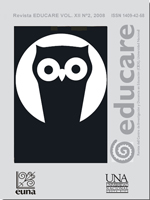Influencia del cine en la Generación del 27
DOI:
https://doi.org/10.15359/ree.12-2.5Keywords:
literature, cinema, poetry, the 1927 generationAbstract
This article focuses on the influence cinema has had on literature, since as we have seen, the arrival of filmmakers led to a cultural revolution. The world of cinema was joined to other traditional arts, suchs as painting and literature, which man had already used to express his ideas and feelings. Cinema forms part of the new 20th century trends, influencing the poets of creating new imagery and metaphors which so greatly enhanced their work.References
Alberti, R. (1981). Cal y canto, Madrid: Alianza.
Bikandi‐Mejías, A. (1997). Galaxia textual: cine y literatura, “Tristana” (Galdós y Buñuel).
Madrid: Pliegos.
Buñuel, L. (1983). Mi último suspiro. (Memorias). Barcelona:Plaza y Janés.
García Jambrina, L. (Mar.‐Abr., 1998). La elocuencia del cine mudo: cine y poesía en Rafael
Alberti, Clarín, Año IV, N º 20, s. p.
Gubern, R. (1999). Proyector de luna. La Generación del 27 y el cine. Barcelona: Anagrama.
Gutiérrez Carbajo, F. (1993). Literatura y cine. Madrid: UNED.
Monegal, A. (1994). Viaje a la luna. Valencia: Pre‐textos.
Morris, C. B. (1993). La acogedora oscuridad. El cine y los escritores españoles (1920‐1936).
Córdoba: Filmoteca de Andalucía.
Pérez Bowie, J. A. (1996). Materiales para un sueño. En torno a la recepción del cine en España,
‐1936. Salamanca: Cervantes.
Sánchez Noriega, J. L. (2000). De la literatura al cine. Teoría y análisis de la adaptación.
Barcelona: Paidós Ibérica.
Sánchez Vidal, A. (1993). La Generación del 27 y el cine. Cuadernos Hispanoamericanos, Nº 514‐
, pp. 125‐142.
Utrera, R. (1987). Federico García Lorca. / Cine. El cine en su obra. Su obra en el cine. Sevilla:
Asociación de Escritores Cinematográficos de Andalucía.
Utrera, R. (2002). Luis Cernuda. Recuerdo cinematográfico. Sevilla: Fundación El Monte.
Downloads
Published
How to Cite
Issue
Section
License
1. In case the submitted paper is accepted for publication, the author(s) FREELY, COSTLESS, EXCLUSIVELY AND FOR AN INDEFINITE TERM transfer copyrights and patrimonial rights to Universidad Nacional (UNA, Costa Rica). For more details check the Originality Statement and Copyright Transfer Agreement
2. REUTILIZATION RIGHTS: UNA authorizes authors to use, for any purpose (among them selfarchiving or autoarchiving) and to publish in the Internet in any electronic site, the paper´'s final version, both approved and published (post print), as long as it is done with a non commercial purpose, does not generate derivates without previous consentment and recognizes both publisher's name and authorship.
3. The submission and possible publication of the paper in the Educare Electronic Journal is ruled by the Journal’s editorial policies, the institutional rules of Universidad Nacional and the laws of the Republic of Costa Rica. Additionally, any possible difference of opinion or future dispute shall be settled in accordance with the mechanisms of Alternative Dispute Resolution and the Costa Rican Jurisdiction.
4. In all cases, it is understood that the opinions issued are those of the authors and do not necessarily reflect the position and opinion of Educare, CIDE or Universidad Nacional, Costa Rica. It is also understood that, in the exercise of academic freedom, the authors have carried out a rogorous scientific-academic process of research, reflection and argumentation thar lays within the thematic scope of interest of the Journal.
5. The papers published by Educare Electronic Journal use a Creative Commons License:














 The articles published by Educare Electronic Journal can be shared with a Creative Commons License:
The articles published by Educare Electronic Journal can be shared with a Creative Commons License: 



